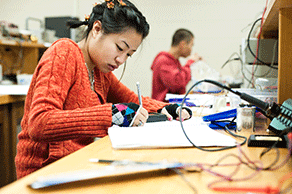
The physics department focuses on undergraduate physics education. Courses are offered at all levels for physics majors, science majors in other disciplines, and non-science majors. The mission of this department is twofold: to open students' minds to the power, beauty, and utility of the physical sciences, and to help students hone their hands-on, experimental skills and their quantitative problem-solving abilities. These attributes are important for many areas of endeavor and can lead to graduate study, a wide variety of careers, and professional programs. In addition to graduate programs in physics, our students have entered the health professions, including medicine, dentistry and pharmacy; engineering, including electrical and mechanical; intellectual property law; computer science; mathematics; astronomy; meteorology; biophysics; business; military; education; and other fields.
Students can:
- Major in physics, analytic track, BS. Greatest depth of physics. Good for graduate school.
- Major in physics, applied science track, BS. Combine physics with other science and math disciplines. Good for graduate school or pre-health programs.
- Major in physics, BA. Combine physics with non-science courses, pre-health courses, etc. Double major is feasible.
- Obtain a dual degree at Loyola in physics and engineering, BS and BSE.
- Major in physics followed by 3-2 program at Columbia University, BS from Loyola, BS from Columbia. Good for students interested in engineering.
- Major in physics and biology (interdisciplinary program), BS.
- Minor in physics.
- Minor in biomedical physics.
Students are encouraged to explore scientific research and employment opportunities throughout the summer and academic year. The Hauber Fellowship provides stipends and discounted housing to students who wish to pursue summer research at Loyola. This award is available to freshmen, sophomore, and junior students. Members of the Loyola faculty have research programs in biological physics, laser spectroscopy, surface physics, computational physics, nuclear physics, solar physics, and the history and philosophy of science. Additionally, there are summer research programs offered at many institutions throughout the United States.
